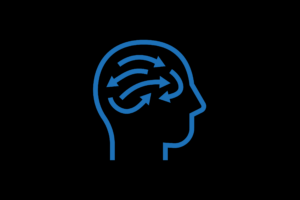What is a Tic?
Tics are involuntary movements or sounds that someone makes without choosing to do them.
What is Tourette’s Syndrome?
Despite what some people think, Tourette’s isn’t all about swearing. In fact, only a small percentage of people with Tourette’s have swearing tics. This is mostly down to the media showing people with the swearing aspect of Tourrette’s.
Recently on social media and TikTok there have also been people faking Tourette’s for ‘clout’ – to gain more ‘likes’ on the internet. Although this is very insensitive, one of the positives to come from this is a slightly better awareness in society of what tics are.
People with Tourette’s can have a wide range of tics; some movement ones (motor tics), and some where they make sounds (vocal tics). There can also be small tics (simple) like little twitches, or a little noise, or bigger tics (complex) where the person might make bigger body movements, a sequence of different movements, multiple sounds or even full sentences.
To be diagnosed with Tourette’s Syndrome, a doctor will check how long the person has been having tics, and check which types they have experienced.
EXAMPLES OF SIMPLE TICS: blinking, tensing muscles, head movements, throat clearing, whistling, tongue clicking.
EXAMPLES OF COMPLEX TICS: throwing things, jumping, pinching, dropping to the floor, hitting things or self, animal sounds, repeating words or phrases
Mythbusting
Having tics does not mean you have Tourette’s Syndrome. Tics can be brought on by anxiety, trauma, an illness or sometimes medications. In these cases the tics may begin suddenly, and then could either be a short-term episode or something which lasts longer. Tourette’s Syndrome is usually a life-long condition, although the severity can change, and people experience a greater amount of tics when stressed, tired or unwell.
If you are experiencing tics, it is helpful to tell a parent/ carer or a doctor, so it can be monitored and they can support you with this. Only a doctor is able to diagnose Tourette’s Syndrome or other neurological conditions that can cause tics.
Can someone with Tourette’s drive?
Yes! Some people with Tourette’s drive. It will depend on your tics and whether you want to drive of course. If you have tics and want to learn, you can discuss it with your doctor, driving instructor and the DVLA.
Do all people with Tourette’s swear?
Only 10% of people with Tourette’s have coprolalia (swearing tics), but a lot of people think that is the only kind of tic a person can have. Not true!
Social media does not cause tics
After the 2020 Covid pandemic, medical professionals noticed a huge increase in teenagers asking for help with tics. At first, it was suggested that spending more time on social media whilst in lockdown and the trend of tik tok videos of people with Tourette’s Syndrome was to blame. However, this was found to be not true, as many of the young people developing tics didn’t even have social media accounts. It is more likely that the anxiety around the pandemic, the disruption to routines, and the stress of returning to school afterwards is what caused so many youngsters to suddenly develop tics.
Is it a good idea to suppress tics?
Everybody with Tourette’s Syndrome is unique in how they experience their tics, so some might think it is good to try to suppress them, whilst others would advise against it. Similar to the way some people can mask their autistic traits, some people can suppress their tics so that others don’t see or hear them. It can be exhausting and very distracting, having to concentrate on not letting out tics, and often they still come out eventually anyway (it can feel like trying to hold in a sneeze). However, some people who experience tics do find it useful being able to suppress them at times. For example, when they are in a quiet or formal environment, or when their tics are causing pain. Not everybody with tics is able to suppress them though.
Top tips:
- Planning ahead and using strategies to keep calm before stress/anxiety kicks in, is likely to help reduce tics
- If someone is ticcing, try not stare as drawing attention to tics can often increase them
- Distractions and participating in hobbies/interests can help prevent or temporarily stop tics occurring, whilst focused on something else. If someone has tics, they should be included in activities the same way any other friend would be.
- Having supportive, non-judgemental friends and family is helpful.
- When schools and workplaces receive training about Tourette’s Syndrome, it helps other people to be more accepting and understand tics
- Prescribed medication can be an option. Some people see a reduction in their tics, but this isn’t the case for everyone and medication isn’t a cure. Discuss this with your doctor IF it is something you want to try as they will be able to explain to you the different options and any potential side effects.
- A greater awareness and understanding of Tourette’s Syndrome in society will help to stop people thinking it is all about swearing
If you want to learn more, you can find out more information from www.tourettes-action.org.uk



